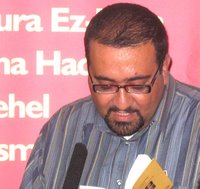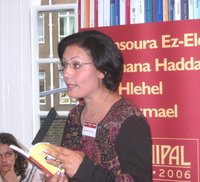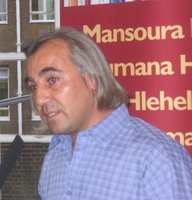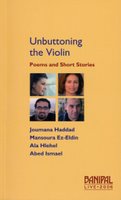

 The fallout from the war in the Middle East has inevitably had some effect on the Banipal Live 2006 Young Arab Writers’ tour held from 14 to 20 August. Four writers from the Arab world were scheduled to travel to Britain for the tour, which was organised by Banipal magazine of modern Arab literature, the British Council and The Reading Agency.
The fallout from the war in the Middle East has inevitably had some effect on the Banipal Live 2006 Young Arab Writers’ tour held from 14 to 20 August. Four writers from the Arab world were scheduled to travel to Britain for the tour, which was organised by Banipal magazine of modern Arab literature, the British Council and The Reading Agency.
One of the writers, the Lebanese journalist, poet and translator Joumana Haddad, was trapped in Lebanon by the war. But she sent a recorded message which was played at the tour’s welcome reception held at Mary Ward House in Bloomsbury, the traditional heart of literary London. In the message Haddad read her exuberantly passionate poem “The Panther Hidden at the Base of her Shoulders”, translated from the French by Marilyn Hacker.
The work of Palestinian writer Ala Hlehel (above right), who lives in Acre, Israel, was given new urgency and relevance by the conflict. At the reception he read from his prescient short story “War”, translated by Anthony Calderbank. In this characteristically sharp, satirical story Hlehel tells of attacks on Haifa seen through the eyes of a Palestinian.
The Syrian poet Abed Ismael (above left) read his self-translated poem “A School Hobby”, and “A Mere Ghost” translated by Issa J Boullata. Mansoura Ez-Eldin of Egypt read from her short story “Conspiracy of Shadows” translated by Paul Starkey. Starkey has described Ez-Eldin's first novel as "remarkable, not only for its freshness of vision but also for its prevision of language - a truly original creation."
To accompany the tour Banipal Books published “Unbuttoning the Violin”, a 122-page anthology of poems and short stories by the four authors. The four have also posted contributions to a tour blog on the British Council website.
The tour included London, Chesterfield, Derby, Manchester and South Shields. The finale took place on Sunday, at the Edinburgh Book Festival in Scotland. The tour producer, Banipal editor and publisher Margaret Obank, pointed out that alongside the tour “we are doing a pilot project with public libraries to encourage people to read Arab authors in translation.”
The tour attracted considerable interest, partly because of recent events in the Middle East, and in last Sunday's edition of BBC Radio Four's Open Book, the popular presenter Mariella Frostrup interviewed Hlehel and Ismael. Ismael, who teaches American literature at Damascus University, is a translator as well as a poet and said in his experience as a tranlslator into Arabic, Latin American writers are still more popular than their European counterparts.
Asked by Frostrup which authors they would recommend to those wishing to explore Arab literature further, Hlehel said: "Let's start with Samuel Shimon, he's a great writer. He wrote An Iraqi in Paris; I think it's moving and a very courageous book. Writers like Raouf Masad should be read, I think he's a great writer." Ismael recommended Iraqi poet Saadi Youssef. "His poetry is characterised by simplicity, he puts a lot of passion in it, let alone the fact that he doesn't have a problem in transcending all taboos."
Sarah Ewans, British Council regional director for the Near East and North Africa said in her address at the welcome reception that the tragedy happening in the Middle East was “really bad news for relationships between people and countries…from our point of view it makes projects like this even more important, to link writers and artists from the region to the UK.”
Ewans said that British Council experience and research in the Near East and North Africa has found that young people in the region “really want the opportunity to convey their ideas and experience to their counterparts here in the UK, and it is very important this is on their own terms, and not on anyone else’s.”
Susannah Tarbush (shorter version published in Saudi Gazette, 22 August 2006)
---------------------------------------- A SCHOOL HOBBY
A SCHOOL HOBBYThe boy – who killed his father –
is still running
As he runs
fields, clouds and nights run with him
shadows run with him
and the house he left behind
The river is running,
as is his note-book
and his exam.
The boy is running
and memory runs with him
The midnight mirror,
the birds flying in his sleep
things and names also run.
in his fancy a blade shines
the cry itself shines
the sun emerges from the cry
and blood is running…
At his footsteps shines a blade
in his fingers which grasp the wind
a blade is running…
a blade endlessly running in his blood.
Abed Ismael
(translated by the author from his collection Sa’at Ramil. Translation first published in Banipal No 23, Summer 2005)


No comments:
Post a Comment